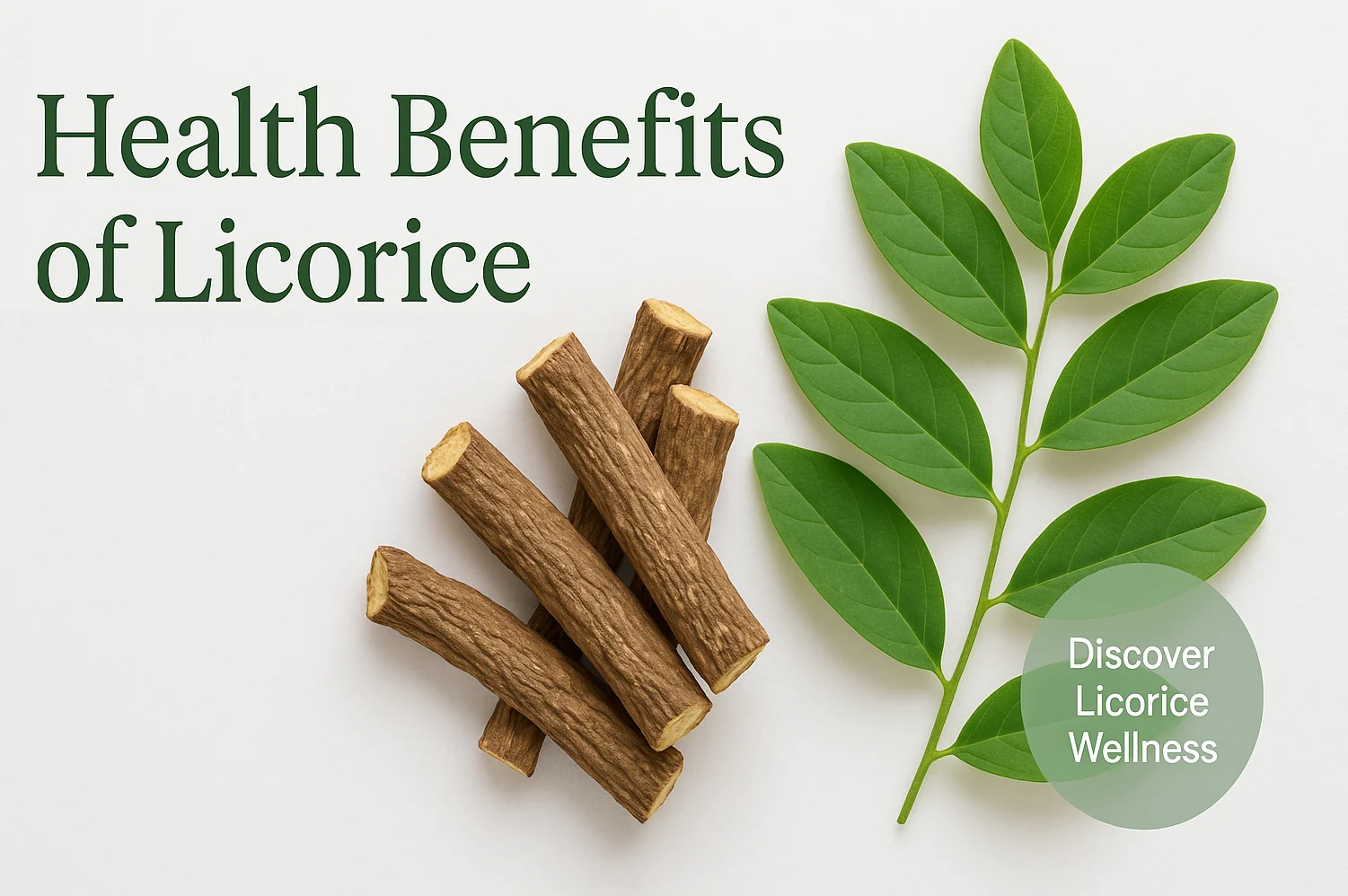
Licorice isn’t just candy flavoring—it’s a classic herb with real-world uses. For thousands of years in Egypt, China, and Ayurveda, licorice root (Glycyrrhiza glabra) has been turned to for settling the gut, soothing scratchy throats, and taking the edge off stress. Modern research helps explain why. For the big-picture context, start with our ayurvedic wellness guide. Then see how the benefits licorice readers ask about could fit your goals—plus simple, safe ways to try licorice herbal remedies.
See if Licorice is Right for You (Quick Quiz)This page contains paid/affiliate links. As an Amazon Associate we earn from qualifying purchases, and we may earn commissions from other partners—at no extra cost to you. Links marked with ‘#ad’ are affiliate links, meaning we may earn a commission at no extra cost to you. Learn more.
Table of Contents
- Key Takeaways — Licorice Benefits
- Shop Licorice Basics
- Ancient Origins of Licorice
- Licorice Benefits: Science-Backed Uses
- Hormonal Balance & Women’s Health
- Safety Considerations for Licorice Use
- Licorice Health Uses: How to Use It Safely
- Is Licorice Right for You? Take the Quiz
- Licorice Benefits — FAQ
- Conclusion: Licorice’s Sweet Potential
Key Takeaways — Licorice Benefits
- Ancient Healing Herb: Used for centuries across Ayurveda and TCM.
- Gut Health: Soothes reflux/ulcers; DGL is usually the safer long-term choice.
- Immune & Inflammation: Traditional use plus modern research.
- Stress Support: May aid resilience when used appropriately.
- Safety first: Whole-root licorice isn’t for everyone; review the safety notes below.
My go-to formats that fit this article. Choose what matches how you like to use licorice.
Editor’s Picks — Licorice Basics
Top 3My go-to formats that fit this article. Choose what matches how you like to use licorice.
Alcohol-Free Licorice Tincture (Organic, 2 oz)
Easy, alcohol-free drops with a mild taste — perfect for simple, short-term support and precise dosing.
- Best for: Quick, portable use
- Format: Liquid drops
Organic Licorice Root Powder (1 lb)
Single-ingredient bulk powder — versatile for DIY teas or occasional topical masks.
- Best for: Tea, blends, skincare
- Format: Bulk powder
Licorice Pastilles (Bulk Bag)
Travel-friendly pastilles with a light anise–fennel taste — handy for throat comfort on the go.
- Best for: On-the-go soothing
- Format: 800+ piece bulk bag
Ancient Origins of Licorice
“Glycyrrhiza” means “sweet root.” Egyptians brewed licorice tea; TCM and Ayurveda use it to harmonize formulas and calm digestion. Today researchers explore active compounds like glycyrrhizin, flavonoids, and triterpenoids to understand its wide-ranging actions.

Benefits Licorice: Science-Backed Uses
These are the most practical licorice wellness benefits — with quick notes on when to choose DGL over whole-root. Use this as a guide to talk with your practitioner.
Gut & Digestion
For reflux, indigestion, and ulcers, licorice can be soothing — especially in DGL form for ongoing support.
What it does
- Ulcers & heartburn: DGL promotes protective mucus over the stomach and esophagus, buffering acid.
- Indigestion: Spasm-calming actions may reduce bloat and discomfort.
- H. pylori: Several licorice constituents show inhibitory activity in lab and clinical settings.
Why it works
Flavonoids and other compounds are studied for anti-inflammatory and demulcent effects that reinforce the mucosal barrier. A helpful overview is this open-access review on licorice in dyspepsia/ulcers (Journal of Research in Medical Sciences, 2016).
Real-life tip
Many people use DGL chewables 15–20 minutes before a trigger meal. If sweets set you off, consider the alcohol-free tincture in tiny sips instead.
Traditional & modern insights
- Ayurveda: Soothes “pitta” in the stomach and supports regularity.
- TCM: Often included to “harmonize” digestive blends and reduce harshness.
Immune & Respiratory
What it does
- Antiviral & antibacterial: Glycyrrhizin and flavonoids are studied for broad activity against common respiratory microbes.
- Throat comfort: Warm licorice tea can feel soothing when a tickle starts.
- Expectorant: Traditionally used to loosen mucus and calm an irritated cough.
Everyday use
At the very first sign of a scratchy throat, a simple tea or a few pastilles can be a gentle nudge while you rest, hydrate, and keep meals light.
Licorice Herbal Remedies for Inflammation
What it does
- Tissues & skin: Often found in calming creams and balms; many people report less redness and itching.
- Joints & airways: Traditional texts describe easing of “heat,” tightness, and irritation.
Why it works
Licorice appears to influence inflammatory messengers while acting as a soothing demulcent. That combination is why it shows up in many classic blends aimed at “cooling” irritated tissues.
Try this
Powder + warm water makes a quick paste for occasional topical masks. Patch test first and avoid the eyes; discontinue if irritation occurs.
Stress & Adrenals
What it does
- Fatigue: Slows conversion of cortisol to cortisone, which may help maintain steadier energy when you’re run down.
- Coping: Described as an adaptogen in traditional systems when used appropriately with sleep, breathwork, and protein-rich meals.
Practical take
If “wired-and-tired,” tiny amounts of the tincture in the morning may feel steadier than afternoon/evening use. Cycle off regularly and check in with your clinician.
Hormonal Balance & Women’s Health
Licorice interacts with the endocrine system, so it can be supportive for some and contraindicated for others. Respect the nuance here.
- PMS relief: Many find less irritability, bloating, and breast tenderness when licorice is paired with magnesium and sleep hygiene.
- Menopause: Small studies suggest fewer hot flashes and steadier mood; evidence is preliminary and not a substitute for medical care.
- PCOS (caution): Early data hints at lowering androgens in some cases; this requires medical supervision and labs.
Important: Because of hormone-sensitive conditions and potential medication interactions, anyone exploring licorice for reproductive goals should work with a clinician.
Safety Considerations for Licorice Use
Whole licorice root (glycyrrhizin) can raise blood pressure and lower potassium in susceptible people. DGL removes most glycyrrhizin and is often chosen for ongoing digestive support.
Who Should Avoid Licorice?
- High blood pressure: Sodium/water retention can elevate BP.
- Pregnancy & breastfeeding: Avoid unless your clinician advises otherwise.
- Kidney disease: Can worsen fluid/electrolyte balance.
- Heart conditions: Arrhythmia risk rises with low potassium.
- Low potassium: Licorice can deplete potassium further.
- Drug interactions: Use caution with diuretics, corticosteroids, digoxin, or certain BP meds.
“The sweet taste of licorice packs a potent punch. While beneficial, whole licorice can be unsafe for those with high blood pressure or heart issues. Always consult a professional.”
Licorice Health Uses: How to Use It Safely
If the benefits licorice suit your goals, here are practical licorice health uses and ways to apply them:
- DGL licorice: Popular for reflux/ulcers; chewables 15–20 minutes before meals are a common pattern.
- Tea: 1 tsp powder or a tea bag steeped 8–10 minutes; pleasant daily ritual. Track total glycyrrhizin if combining with other forms.
- Tinctures: Precise dosing (our favorite pick is alcohol-free). Start low; note taste is naturally sweet.
- Capsules/powder: Standardized or single-ingredient options for easy use in blends or smoothies.
Dosage: Follow labels or your provider’s guidance. Keep whole-root courses short (often 4–6 weeks), reassessing with a professional if you plan longer use.
DIY idea: For a simple evening tea, combine licorice powder with ginger and fennel; for skincare, a tiny pinch of powder with aloe gel can make a quick spot mask (patch test first).
Is Licorice Right for You? Take the Quiz
Should You Try Licorice? 🤔
Answer a few questions to see if it aligns with your goals. Always consult a healthcare professional for personalized advice.
Your Health Goals:
Your Health Conditions:
Licorice Benefits — FAQ
Conclusion: Licorice’s Sweet Potential
Licorice can support digestion, immunity, inflammation, stress, and even some hormone-related concerns — with DGL often the gentler long-term choice. For most people, the best results come from small, consistent amounts paired with foundational habits from our Ayurvedic Wellness Guide. If you’re curious about skincare uses or DIY blends, the powder is versatile; for simple dosing, the organic glycerite tincture is hard to beat; and for throat comfort on travel days, the pastilles are an easy win. Here’s to enjoying licorice wellness benefits safely and intelligently.
Quick Recap — Licorice Basics (Amazon links)
Disclaimer: This article is for informational purposes only and does not constitute medical advice. Always consult with a qualified healthcare professional before beginning any herbal regimen, especially if you are pregnant, nursing, on medication, or have a medical condition. Licorice-specific caution: Whole-root licorice (glycyrrhizin) can raise blood pressure and affect potassium. Avoid if you have heart or kidney disease, are pregnant, or take interacting medicines (e.g., diuretics, corticosteroids, digoxin, blood-pressure meds). DGL licorice is often the gentler option for digestion — follow label directions.


